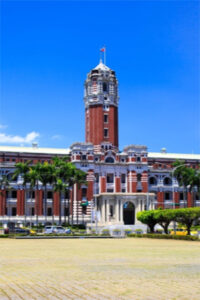 Key points China’s peaceful unification policy and cross-Strait relations are pluralistic. Weak Democratic Progressive Party government, China plans to unseat it in 2028 In addition to defense capabilities, international cooperation is necessary to protect democracy Matsuda Yasuhiro, Professor, The University of Tokyo Taiwan’s presidential and Legislative Yuan elections were held on January 13, 2024, and William Lai of the ruling Democratic Progressive Party (DPP) was elected president. This time, as there were three strong candidates, Lai’s vote share was only 40.05%, and the ruling party is expected to fall short of a majority in the Legislative Yuan election, resulting in a “weak DPP” government. The international community has been paying close attention to the presidential election because of fears that a war could break out in the Taiwan Strait, following in the footsteps of Russia and Ukraine, and Israel and the ... ... [Read more]
Key points China’s peaceful unification policy and cross-Strait relations are pluralistic. Weak Democratic Progressive Party government, China plans to unseat it in 2028 In addition to defense capabilities, international cooperation is necessary to protect democracy Matsuda Yasuhiro, Professor, The University of Tokyo Taiwan’s presidential and Legislative Yuan elections were held on January 13, 2024, and William Lai of the ruling Democratic Progressive Party (DPP) was elected president. This time, as there were three strong candidates, Lai’s vote share was only 40.05%, and the ruling party is expected to fall short of a majority in the Legislative Yuan election, resulting in a “weak DPP” government. The international community has been paying close attention to the presidential election because of fears that a war could break out in the Taiwan Strait, following in the footsteps of Russia and Ukraine, and Israel and the ... ... [Read more]
Archives
Back Number | Category Archives | Author Archives
Category Archives
East Asia after Taiwan’s Presidential Election: China’s armed unification is unrealistic
The Need for “Feminist Diplomacy” in a Divided World — Expectations for Foreign Minister Kamikawa Yoko
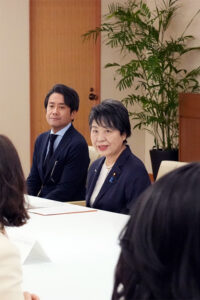 Mimaki Seiko, Associate Professor, Doshisha University Japan may soon see its first “feminist foreign minister.” There is such hope in Kamikawa Yoko, who assumed the position of Foreign Minister in September 2023. Since her appointment, Foreign Minister Kamikawa has offered a female perspective to conflict prevention and peacebuilding, and has enthusiastically promoted the “Women, Peace and Security (WPS)” initiative, which aims for more sustainable peace. A task force within the Ministry of Foreign Affairs was launched at the end of January. This task force is comprised of regional bureaus that handle bilateral relations with other countries, the International Cooperation Bureau, which handles Official Development Assistance (ODA), and more. At the task force launch meeting, Foreign Minister Kamikawa expressed her desire to “utilize a WPS perspective in an all-Japan manner” in cooperation with other ministries and agencies. She also spoke of her eagerness ... ... [Read more]
Mimaki Seiko, Associate Professor, Doshisha University Japan may soon see its first “feminist foreign minister.” There is such hope in Kamikawa Yoko, who assumed the position of Foreign Minister in September 2023. Since her appointment, Foreign Minister Kamikawa has offered a female perspective to conflict prevention and peacebuilding, and has enthusiastically promoted the “Women, Peace and Security (WPS)” initiative, which aims for more sustainable peace. A task force within the Ministry of Foreign Affairs was launched at the end of January. This task force is comprised of regional bureaus that handle bilateral relations with other countries, the International Cooperation Bureau, which handles Official Development Assistance (ODA), and more. At the task force launch meeting, Foreign Minister Kamikawa expressed her desire to “utilize a WPS perspective in an all-Japan manner” in cooperation with other ministries and agencies. She also spoke of her eagerness ... ... [Read more]
Emphasizing the Importance of Evidence-based Reporting on China
 Kajitani Kai, Professor, Kobe University Graduate School Recently, there has been a growing awareness in Japan of the importance of “evidence” in reporting and policymaking. Especially when making decisions about highly opaque topics like China, which is my specialty, it is extremely important to support and verify evidence such as statistical data. On the other hand, some voices are sounding the alarm that politicians and large corporations are waiving evidence and objectivity while ignoring the small voices of those affected, causing divisions in society. While there are some valid aspects to this criticism, I cannot agree with an attitude that places too much emphasis on individual narratives. Rather, we should pay attention to how much of the “evidence” that the government and others present is “falsifiable” by third parties. For example, since Russia’s invasion of Ukraine in February 2022, more attention has ... ... [Read more]
Kajitani Kai, Professor, Kobe University Graduate School Recently, there has been a growing awareness in Japan of the importance of “evidence” in reporting and policymaking. Especially when making decisions about highly opaque topics like China, which is my specialty, it is extremely important to support and verify evidence such as statistical data. On the other hand, some voices are sounding the alarm that politicians and large corporations are waiving evidence and objectivity while ignoring the small voices of those affected, causing divisions in society. While there are some valid aspects to this criticism, I cannot agree with an attitude that places too much emphasis on individual narratives. Rather, we should pay attention to how much of the “evidence” that the government and others present is “falsifiable” by third parties. For example, since Russia’s invasion of Ukraine in February 2022, more attention has ... ... [Read more]
“Liberal” and pacifism in postwar Japan—their given conditions and historical background
 Oguma Eiji, Faculty of Policy Management, Keio University What is “liberal”? Even in Europe and America, there is no agreed-upon definition. In terms of economic and social policies, it is sometimes used in Western Europe to mean “laissez-faire,” but in the United States it is also used to mean large government spending.[1] “Liberal” has different meanings depending on the history and political context of the country. So what is “liberal” in postwar Japan? How does it relate to security policy, which has been the main axis of conflict in Japanese party politics from the postwar period to the present, and to pacifism, which was enshrined in the postwar constitution? This paper examines these two questions against the historical background of postwar Japan. This paper has four parts. First, I will review the historical evolution of the term “liberal” in Japanese political coverage. Second, ... ... [Read more]
Oguma Eiji, Faculty of Policy Management, Keio University What is “liberal”? Even in Europe and America, there is no agreed-upon definition. In terms of economic and social policies, it is sometimes used in Western Europe to mean “laissez-faire,” but in the United States it is also used to mean large government spending.[1] “Liberal” has different meanings depending on the history and political context of the country. So what is “liberal” in postwar Japan? How does it relate to security policy, which has been the main axis of conflict in Japanese party politics from the postwar period to the present, and to pacifism, which was enshrined in the postwar constitution? This paper examines these two questions against the historical background of postwar Japan. This paper has four parts. First, I will review the historical evolution of the term “liberal” in Japanese political coverage. Second, ... ... [Read more]
Beyond an Age of Chaos: A Time to Rethink the Significance of Elections
 Key points Elections are manipulated to stay in power in authoritarian countries Political division and growing electoral fraud also in democratic countries Administrations calling snap general elections when it suits them should also be scrutinized Higashijima Masaaki, Associate Professor, University of Tokyo This year, 2024 is a year with elections around the world. In addition to the United States and Russia, which have a major influence on international politics, national elections are also planned in regional powers such as Indonesia, India, Mexico, South Korea, Taiwan, and other neighboring countries and regions. Depending on the ongoing political funding issue, a dissolution of the Lower House and a general election may also be on the horizon in Japan. Elections have long been synonymous with representative democracy. What are the implications of the upcoming elections in so many countries for the future of the ... ... [Read more]
Key points Elections are manipulated to stay in power in authoritarian countries Political division and growing electoral fraud also in democratic countries Administrations calling snap general elections when it suits them should also be scrutinized Higashijima Masaaki, Associate Professor, University of Tokyo This year, 2024 is a year with elections around the world. In addition to the United States and Russia, which have a major influence on international politics, national elections are also planned in regional powers such as Indonesia, India, Mexico, South Korea, Taiwan, and other neighboring countries and regions. Depending on the ongoing political funding issue, a dissolution of the Lower House and a general election may also be on the horizon in Japan. Elections have long been synonymous with representative democracy. What are the implications of the upcoming elections in so many countries for the future of the ... ... [Read more]
Party Politics, Factions, and Hereditary Politics: The Current State of Japanese Politics
 Shimizu Yuichiro, Professor, Keio University Factional politics have once again become an issue. It was discovered that the largest faction, the Abe faction (Seiwa Political Analysis Council, Seiwakai), has engaged in fraudulent accounting with regard to political funding to the party. Moreover, it was found that the Nikai faction (Shisuikai), led by shrewd former secretary-general Nikai Toshihiro, and the Kishida faction (Kochikai), to which the current prime minister belongs, have had similar problems. The revelations have prompted strong criticism of factional politics. In response, Prime Minister Kishida Fumio quickly announced that he would dissolve his faction, Kochikai. Kochikai was founded by Ikeda Hayato (1899–1965), known for his Income Doubling Plan. As it inherits the lineage of Yoshida Shigeru’s (1878–1967) Liberal Party, it considers itself part of the “conservative mainstream” and is the third faction, which has produced five prime ministers as well as ... ... [Read more]
Shimizu Yuichiro, Professor, Keio University Factional politics have once again become an issue. It was discovered that the largest faction, the Abe faction (Seiwa Political Analysis Council, Seiwakai), has engaged in fraudulent accounting with regard to political funding to the party. Moreover, it was found that the Nikai faction (Shisuikai), led by shrewd former secretary-general Nikai Toshihiro, and the Kishida faction (Kochikai), to which the current prime minister belongs, have had similar problems. The revelations have prompted strong criticism of factional politics. In response, Prime Minister Kishida Fumio quickly announced that he would dissolve his faction, Kochikai. Kochikai was founded by Ikeda Hayato (1899–1965), known for his Income Doubling Plan. As it inherits the lineage of Yoshida Shigeru’s (1878–1967) Liberal Party, it considers itself part of the “conservative mainstream” and is the third faction, which has produced five prime ministers as well as ... ... [Read more]
Development of Central Bank Digital Currency in the Asia-Pacific Region
 In Cambodia, Bakong, the world’s first digital currency issued by a central bank, has been welcomed by the people and widely established. The author, who helped design and implement it, discusses the factors behind its success in the country, as well as its further development and future opportunities in the Asia-Pacific region. Miyazawa Kazumasa, President, Soramitsu Co., Ltd. 1 Introduction This article introduces the development of central bank digital currencies (CBDCs) in the Asia-Pacific region and the efficiency of cross-border remittances, taking into account the latest developments in Cambodia. In Cambodia, the digital currency “Bakong” issued by the National Bank of Cambodia (NBC) officially launched in October 2020. Japanese fintech startup Soramitsu Co., Ltd. also participated in the development and design of Bakong. I currently serve as the president and representative director of Soramitsu, and since 2017 I have also served as ... ... [Read more]
In Cambodia, Bakong, the world’s first digital currency issued by a central bank, has been welcomed by the people and widely established. The author, who helped design and implement it, discusses the factors behind its success in the country, as well as its further development and future opportunities in the Asia-Pacific region. Miyazawa Kazumasa, President, Soramitsu Co., Ltd. 1 Introduction This article introduces the development of central bank digital currencies (CBDCs) in the Asia-Pacific region and the efficiency of cross-border remittances, taking into account the latest developments in Cambodia. In Cambodia, the digital currency “Bakong” issued by the National Bank of Cambodia (NBC) officially launched in October 2020. Japanese fintech startup Soramitsu Co., Ltd. also participated in the development and design of Bakong. I currently serve as the president and representative director of Soramitsu, and since 2017 I have also served as ... ... [Read more]
Global Trade Reconfiguration in the Election Super Year
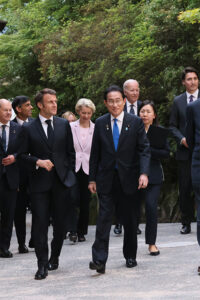 Ito Sayuri, Executive Director, Economic Research Department, NLI Research Institute Since the end of the Cold War, supply chains have expanded globally, and there are concerns about fragmentation due to multiple factors, including the escalating conflict between the United States and China, the COVID-19 pandemic, Russia’s invasion of Ukraine, and the climate crisis. At the G7 Hiroshima Summit in 2023, de-coupling was rejected as an approach to economic resilience and economic security, and a policy based on de-risking was affirmed. Friendshoring, the formation of supply chains among allied or like-minded countries; nearshoring, the relocation of business to neighboring countries; and reshoring and onshoring, the return of business to a country, became buzzwords to indicate the direction of restructuring supply chains. Changes are already visible in global trade data. In 2023, the amount of trade between the United States, the European Union and ... ... [Read more]
Ito Sayuri, Executive Director, Economic Research Department, NLI Research Institute Since the end of the Cold War, supply chains have expanded globally, and there are concerns about fragmentation due to multiple factors, including the escalating conflict between the United States and China, the COVID-19 pandemic, Russia’s invasion of Ukraine, and the climate crisis. At the G7 Hiroshima Summit in 2023, de-coupling was rejected as an approach to economic resilience and economic security, and a policy based on de-risking was affirmed. Friendshoring, the formation of supply chains among allied or like-minded countries; nearshoring, the relocation of business to neighboring countries; and reshoring and onshoring, the return of business to a country, became buzzwords to indicate the direction of restructuring supply chains. Changes are already visible in global trade data. In 2023, the amount of trade between the United States, the European Union and ... ... [Read more]
A Tough Path to a Virtuous Price-Wage Circle
 Tsuru Kotaro, Program Director and Faculty Fellow, Research Institute of Economy, Trade and Industry (RIETI) Wage increases are attracting intense attention as a touchstone for the future course of the Japanese economy. The Japanese government and the Bank of Japan are closely watching how the forthcoming shunto spring wage negotiations will play out. There are signs of a shift in the long-entrenched norm that prices and wages simply do not rise, which has permeated the nation throughout the long period of deflation, and now is the time to aim for an increasing, virtuous circle between prices and wages. This article will examine whether such a virtuous circle can become sustainable. First, when assessing the shunto wage increase, it is important to understand that it usually consists of two portions—the regular annual pay increase that company employees receive, and the increase in the base pay. It is ... ... [Read more]
Tsuru Kotaro, Program Director and Faculty Fellow, Research Institute of Economy, Trade and Industry (RIETI) Wage increases are attracting intense attention as a touchstone for the future course of the Japanese economy. The Japanese government and the Bank of Japan are closely watching how the forthcoming shunto spring wage negotiations will play out. There are signs of a shift in the long-entrenched norm that prices and wages simply do not rise, which has permeated the nation throughout the long period of deflation, and now is the time to aim for an increasing, virtuous circle between prices and wages. This article will examine whether such a virtuous circle can become sustainable. First, when assessing the shunto wage increase, it is important to understand that it usually consists of two portions—the regular annual pay increase that company employees receive, and the increase in the base pay. It is ... ... [Read more]
Japanese Musicians Active in Europe
 Choki Seiji, Professor Emeritus of the University of Tokyo, Music Critic “Europe” for classical musicians Like Sakamoto Ryuichi, who was based in New York, there are many musicians who dedicate themselves to their creative and performing activities while living abroad. The fact that Utada Hikaru, who was born in the United States, is based in London does not seem strange at all, perhaps because we live in the 21st century, where globalization has progressed. However, if you think about whether there were any such Japanese popular music (I dare say) artists living abroad before Sakamoto’s generation, it is true that you cannot immediately think of a specific name. After all, in the world of popular music, where the latest styles are emerging mainly in the Anglo-American region, it is stimulating for musicians to live in London, New York, and Berlin, which has changed ... ... [Read more]
Choki Seiji, Professor Emeritus of the University of Tokyo, Music Critic “Europe” for classical musicians Like Sakamoto Ryuichi, who was based in New York, there are many musicians who dedicate themselves to their creative and performing activities while living abroad. The fact that Utada Hikaru, who was born in the United States, is based in London does not seem strange at all, perhaps because we live in the 21st century, where globalization has progressed. However, if you think about whether there were any such Japanese popular music (I dare say) artists living abroad before Sakamoto’s generation, it is true that you cannot immediately think of a specific name. After all, in the world of popular music, where the latest styles are emerging mainly in the Anglo-American region, it is stimulating for musicians to live in London, New York, and Berlin, which has changed ... ... [Read more]
Kemari and the Japanese: A History of the Acceptance and Maturing of Foreign Sports
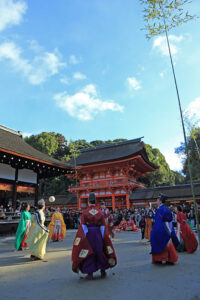 Tanigama Hironori, Professor, Toyo University It is often said that Japanese people began to adopt sports from overseas in the Meiji period (1868–1912). However, the history of foreign sports in Japan is long, and the leisurely aristocrats of ancient times were among the first to experience sports from the continent and enjoy them as an elegant hobby. Kemari, or shukiku (an ancient football game, 蹴鞠), is the most long-lived and widely played foreign athletic game in Japanese history, played by people from all walks of life. In the ancient Imperial Court, a variety of sports were performed by competitors from the provinces during the festival days of the year, while the Emperor and senior aristocrats watched and enjoyed them. Kemari, on the other hand, falls into the category of “sports to do,” played by the ancient nobility themselves. In ancient China, there ... ... [Read more]
Tanigama Hironori, Professor, Toyo University It is often said that Japanese people began to adopt sports from overseas in the Meiji period (1868–1912). However, the history of foreign sports in Japan is long, and the leisurely aristocrats of ancient times were among the first to experience sports from the continent and enjoy them as an elegant hobby. Kemari, or shukiku (an ancient football game, 蹴鞠), is the most long-lived and widely played foreign athletic game in Japanese history, played by people from all walks of life. In the ancient Imperial Court, a variety of sports were performed by competitors from the provinces during the festival days of the year, while the Emperor and senior aristocrats watched and enjoyed them. Kemari, on the other hand, falls into the category of “sports to do,” played by the ancient nobility themselves. In ancient China, there ... ... [Read more]
Why is the National Museum of Modern Art, Tokyo holding the exhibition “Women and Abstraction”?
 Fukushima Natsuko, Executive Editor, Tokyo Art Beat An editor of Tokyo Art Beat speaks to the people in charge about the rediscovery of female artists and gender balance in the collection. The exhibition “Women and Abstraction” was realized by a team of six people A small exhibition “Women and Abstraction” (September 20 to December 3, 2023) is currently being held at Gallery 4, which displays the collection of the National Museum of Modern Art, Tokyo (MOMAT). This is an ambitious exhibition that introduces a number of works from the museum’s collection by women artists who have worked with abstract expression from the immediate postwar period to the present day. This exhibition is a reexamination and curation of works from the collection, including artists who have rarely been introduced to the public, as well as notable artists who are rapidly being reevaluated, and ... ... [Read more]
Fukushima Natsuko, Executive Editor, Tokyo Art Beat An editor of Tokyo Art Beat speaks to the people in charge about the rediscovery of female artists and gender balance in the collection. The exhibition “Women and Abstraction” was realized by a team of six people A small exhibition “Women and Abstraction” (September 20 to December 3, 2023) is currently being held at Gallery 4, which displays the collection of the National Museum of Modern Art, Tokyo (MOMAT). This is an ambitious exhibition that introduces a number of works from the museum’s collection by women artists who have worked with abstract expression from the immediate postwar period to the present day. This exhibition is a reexamination and curation of works from the collection, including artists who have rarely been introduced to the public, as well as notable artists who are rapidly being reevaluated, and ... ... [Read more]
A Nobel Prize Born of Healthy Argument
 Manabe Syukuro, recipient of the Nobel Prize in Physics, interviewed at his home: Learn from your rivals and play to your strengths – the world-renowned 90-year-old authority shares the secrets to reaching the pinnacle of achievement Interviewed by Tsuyama Keiko, journalist When I look back on it, my life as a researcher has been a string of good luck. A paper I wrote back in graduate school happened to catch the attention of an American researcher and I was invited to the US. Then, at a research institute in the US, I was blessed with good supervisors and staff in a positive environment, and I was able to immerse myself in research with full access to a supercomputer. That string of good luck continued all the way to receiving the Nobel Prize, but it truly came as a surprise. When you look at ... ... [Read more]
Manabe Syukuro, recipient of the Nobel Prize in Physics, interviewed at his home: Learn from your rivals and play to your strengths – the world-renowned 90-year-old authority shares the secrets to reaching the pinnacle of achievement Interviewed by Tsuyama Keiko, journalist When I look back on it, my life as a researcher has been a string of good luck. A paper I wrote back in graduate school happened to catch the attention of an American researcher and I was invited to the US. Then, at a research institute in the US, I was blessed with good supervisors and staff in a positive environment, and I was able to immerse myself in research with full access to a supercomputer. That string of good luck continued all the way to receiving the Nobel Prize, but it truly came as a surprise. When you look at ... ... [Read more]
How We Deal with Science: The Increasing Role of and Involvement of Ordinary People
 Sakura Osamu, Professor, University of Tokyo Key Points Cultivating relationships of trust between politicians and expert groups The shift of science and technology patrons from the state to the private sector How ideas from ordinary people can make up for the limitations of experts The spread of COVID-19 has brought a major issue to the fore: what is the right relationship between political judgment and scientific knowledge, or between politicians and experts? We are often finding the opinions of experts grounded in scientific knowledge to be at odds with the decision-making of politicians. This issue is not limited to Japan; it is causing great confusion around the world, including in European countries. It is also not something that sprung up overnight. In Japan’s case, after the accident at Tokyo Electric Power Company’s Fukushima Daiichi nuclear power plant (the “NPP accident”) caused by the Great ... ... [Read more]
Sakura Osamu, Professor, University of Tokyo Key Points Cultivating relationships of trust between politicians and expert groups The shift of science and technology patrons from the state to the private sector How ideas from ordinary people can make up for the limitations of experts The spread of COVID-19 has brought a major issue to the fore: what is the right relationship between political judgment and scientific knowledge, or between politicians and experts? We are often finding the opinions of experts grounded in scientific knowledge to be at odds with the decision-making of politicians. This issue is not limited to Japan; it is causing great confusion around the world, including in European countries. It is also not something that sprung up overnight. In Japan’s case, after the accident at Tokyo Electric Power Company’s Fukushima Daiichi nuclear power plant (the “NPP accident”) caused by the Great ... ... [Read more]
The Perfect Return that Sent the Hayabusa2 Control Room into a Frenzy: The secret to scoring “10,000 points out of a perfect 100” is to predict the difficulties and to be prepared with three options
 Tsuda Yuichi, Professor at the Institute of Space and Astronautical Science (ISAS), the Japan Aerospace Exploration Agency (JAXA) Interview and text by Yamane Kazuma, nonfiction writer On a visit to the Institute of Space and Astronautical Science (ISAS) and the Japan Aerospace Exploration Agency (JAXA) in Sagamihara City, Kanagawa Prefecture on December 18, 2020, Hagiuda Koichi, Minister of Education, Culture, Sports, Science and Technology, announced some good news at the press conference. “The capsule brought back by Hayabusa2 contains approximately 5.4 grams of soil samples collected from the asteroid Ryugu. This world-class technology has collected an amount that is fifty times above the target of 0.1 gram.” The first-generation Hayabusa was the first time since the moon landings for humanity to achieve the spectacular feat of bringing back a sample from a celestial body, but that sample was no more than three ... ... [Read more]
Tsuda Yuichi, Professor at the Institute of Space and Astronautical Science (ISAS), the Japan Aerospace Exploration Agency (JAXA) Interview and text by Yamane Kazuma, nonfiction writer On a visit to the Institute of Space and Astronautical Science (ISAS) and the Japan Aerospace Exploration Agency (JAXA) in Sagamihara City, Kanagawa Prefecture on December 18, 2020, Hagiuda Koichi, Minister of Education, Culture, Sports, Science and Technology, announced some good news at the press conference. “The capsule brought back by Hayabusa2 contains approximately 5.4 grams of soil samples collected from the asteroid Ryugu. This world-class technology has collected an amount that is fifty times above the target of 0.1 gram.” The first-generation Hayabusa was the first time since the moon landings for humanity to achieve the spectacular feat of bringing back a sample from a celestial body, but that sample was no more than three ... ... [Read more]
Labor Unions Today: The Challenge of Addressing Division Among “Non-regular Workers”
 Key points The “voice” function of labor unions in negotiations is important The cost of organization is increasing with the shift to a service economy Increasing the organization of non-regular workers to approach that of regular employees Umezaki Osamu, Professor, Hosei University Among the economic entities in Japan today, labor unions are markedly hard to understand. Historically, labor unions boasted a high unionization ratio and had clear goals, such as raising wages in the spring labor offensive (shunto) and eliminating status differences for workers and employees. Moreover, Japanese society accepted that they had the power to do so. There are few labor issues nowadays, so the presence of labor unions seems to be diminishing. However, with stagnant wage increases and the emergence of new labor problems, labor unions are arguably as important as ever. The environment surrounding labor unions is harsh. ... ... [Read more]
Key points The “voice” function of labor unions in negotiations is important The cost of organization is increasing with the shift to a service economy Increasing the organization of non-regular workers to approach that of regular employees Umezaki Osamu, Professor, Hosei University Among the economic entities in Japan today, labor unions are markedly hard to understand. Historically, labor unions boasted a high unionization ratio and had clear goals, such as raising wages in the spring labor offensive (shunto) and eliminating status differences for workers and employees. Moreover, Japanese society accepted that they had the power to do so. There are few labor issues nowadays, so the presence of labor unions seems to be diminishing. However, with stagnant wage increases and the emergence of new labor problems, labor unions are arguably as important as ever. The environment surrounding labor unions is harsh. ... ... [Read more]
Politics and Harassment: Why Aren’t There More Female Assembly Members?
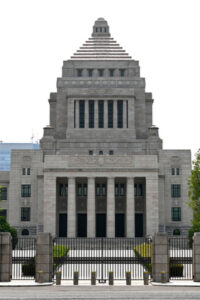 Hamada Mari, Representative of Stand by Women The big problem that came to light Candidates are suddenly hugged while giving a speech on the street, are bombarded with slanderous messages, are yelled at by fellow assembly members, and rumors are spread they don’t know about themselves. These types of damages are cases that I often hear about when conducting harassment interviews with female assembly members. There are various factors behind the low number of female assembly members, one of which is harassment. In recent years, this issue has finally begun to receive attention in the media. The trigger is thought to be largely influenced by the report issued by the Cabinet Office (CAO) in 2021, which included a harassment investigation of assembly members, and the “Revised Act on Promotion of Gender Equality in the Political Field” enacted in the same year. This law ... ... [Read more]
Hamada Mari, Representative of Stand by Women The big problem that came to light Candidates are suddenly hugged while giving a speech on the street, are bombarded with slanderous messages, are yelled at by fellow assembly members, and rumors are spread they don’t know about themselves. These types of damages are cases that I often hear about when conducting harassment interviews with female assembly members. There are various factors behind the low number of female assembly members, one of which is harassment. In recent years, this issue has finally begun to receive attention in the media. The trigger is thought to be largely influenced by the report issued by the Cabinet Office (CAO) in 2021, which included a harassment investigation of assembly members, and the “Revised Act on Promotion of Gender Equality in the Political Field” enacted in the same year. This law ... ... [Read more]
Dialogue between Taiwan and Japan, the Bereaved Families of the Accident across the Ocean
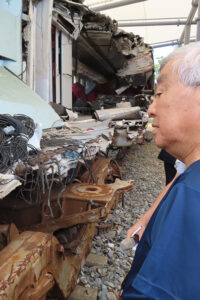 Matsumoto Hajimu, nonfiction writer Taiwan Railway is under pressure to reform due to a series of accidents Taipei Main Station is Taiwan’s largest terminal station, served by conventional lines, Taiwan High Speed Rail (bullet train), Taipei Mass Rapid Transit (MRT) (Metro Taipei), and used by 450,000 people a day. The current 4th generation station building has 6 floors above ground and 4 floors underground. It boasts a palace-like grandeur, with a large crimson roof modeled after the traditional architecture of Southern Fujian Province, China, known as the “Minnan (Southern Fujian) region.” The center of the ground floor is a vast open space, surrounded by a food court and various shops. The third floor and above are used as offices for the Headquarters of the Taiwan Railways Administration (TRA) and other offices, and are not open to the general public. (TRA, commonly known as ... ... [Read more]
Matsumoto Hajimu, nonfiction writer Taiwan Railway is under pressure to reform due to a series of accidents Taipei Main Station is Taiwan’s largest terminal station, served by conventional lines, Taiwan High Speed Rail (bullet train), Taipei Mass Rapid Transit (MRT) (Metro Taipei), and used by 450,000 people a day. The current 4th generation station building has 6 floors above ground and 4 floors underground. It boasts a palace-like grandeur, with a large crimson roof modeled after the traditional architecture of Southern Fujian Province, China, known as the “Minnan (Southern Fujian) region.” The center of the ground floor is a vast open space, surrounded by a food court and various shops. The third floor and above are used as offices for the Headquarters of the Taiwan Railways Administration (TRA) and other offices, and are not open to the general public. (TRA, commonly known as ... ... [Read more]
Global Trade Reconfiguration in the Election Super Year
 Ito Sayuri, Executive Director, Economic Research Department, NLI Research Institute Since the end of the Cold War, supply chains have expanded globally, and there are concerns about fragmentation due to multiple factors, including the escalating conflict between the United States and China, the COVID-19 pandemic, Russia’s invasion of Ukraine, and the climate crisis. At the G7 Hiroshima Summit in 2023, de-coupling was rejected as an approach to economic resilience and economic security, and a policy based on de-risking was affirmed. Friendshoring, the formation of supply chains among allied or like-minded countries; nearshoring, the relocation of business to neighboring countries; and reshoring and onshoring, the return of business to a country, became buzzwords to indicate the direction of restructuring supply chains. Changes are already visible in global trade data. In 2023, the amount of trade between the United States, the European Union and ... ... [Read more]
Ito Sayuri, Executive Director, Economic Research Department, NLI Research Institute Since the end of the Cold War, supply chains have expanded globally, and there are concerns about fragmentation due to multiple factors, including the escalating conflict between the United States and China, the COVID-19 pandemic, Russia’s invasion of Ukraine, and the climate crisis. At the G7 Hiroshima Summit in 2023, de-coupling was rejected as an approach to economic resilience and economic security, and a policy based on de-risking was affirmed. Friendshoring, the formation of supply chains among allied or like-minded countries; nearshoring, the relocation of business to neighboring countries; and reshoring and onshoring, the return of business to a country, became buzzwords to indicate the direction of restructuring supply chains. Changes are already visible in global trade data. In 2023, the amount of trade between the United States, the European Union and ... ... [Read more]
The Need for “Feminist Diplomacy” in a Divided World — Expectations for Foreign Minister Kamikawa Yoko
 Mimaki Seiko, Associate Professor, Doshisha University Japan may soon see its first “feminist foreign minister.” There is such hope in Kamikawa Yoko, who assumed the position of Foreign Minister in September 2023. Since her appointment, Foreign Minister Kamikawa has offered a female perspective to conflict prevention and peacebuilding, and has enthusiastically promoted the “Women, Peace and Security (WPS)” initiative, which aims for more sustainable peace. A task force within the Ministry of Foreign Affairs was launched at the end of January. This task force is comprised of regional bureaus that handle bilateral relations with other countries, the International Cooperation Bureau, which handles Official Development Assistance (ODA), and more. At the task force launch meeting, Foreign Minister Kamikawa expressed her desire to “utilize a WPS perspective in an all-Japan manner” in cooperation with other ministries and agencies. She also spoke of her eagerness ... ... [Read more]
Mimaki Seiko, Associate Professor, Doshisha University Japan may soon see its first “feminist foreign minister.” There is such hope in Kamikawa Yoko, who assumed the position of Foreign Minister in September 2023. Since her appointment, Foreign Minister Kamikawa has offered a female perspective to conflict prevention and peacebuilding, and has enthusiastically promoted the “Women, Peace and Security (WPS)” initiative, which aims for more sustainable peace. A task force within the Ministry of Foreign Affairs was launched at the end of January. This task force is comprised of regional bureaus that handle bilateral relations with other countries, the International Cooperation Bureau, which handles Official Development Assistance (ODA), and more. At the task force launch meeting, Foreign Minister Kamikawa expressed her desire to “utilize a WPS perspective in an all-Japan manner” in cooperation with other ministries and agencies. She also spoke of her eagerness ... ... [Read more]
Party Politics, Factions, and Hereditary Politics: The Current State of Japanese Politics
 Shimizu Yuichiro, Professor, Keio University Factional politics have once again become an issue. It was discovered that the largest faction, the Abe faction (Seiwa Political Analysis Council, Seiwakai), has engaged in fraudulent accounting with regard to political funding to the party. Moreover, it was found that the Nikai faction (Shisuikai), led by shrewd former secretary-general Nikai Toshihiro, and the Kishida faction (Kochikai), to which the current prime minister belongs, have had similar problems. The revelations have prompted strong criticism of factional politics. In response, Prime Minister Kishida Fumio quickly announced that he would dissolve his faction, Kochikai. Kochikai was founded by Ikeda Hayato (1899–1965), known for his Income Doubling Plan. As it inherits the lineage of Yoshida Shigeru’s (1878–1967) Liberal Party, it considers itself part of the “conservative mainstream” and is the third faction, which has produced five prime ministers as well as ... ... [Read more]
Shimizu Yuichiro, Professor, Keio University Factional politics have once again become an issue. It was discovered that the largest faction, the Abe faction (Seiwa Political Analysis Council, Seiwakai), has engaged in fraudulent accounting with regard to political funding to the party. Moreover, it was found that the Nikai faction (Shisuikai), led by shrewd former secretary-general Nikai Toshihiro, and the Kishida faction (Kochikai), to which the current prime minister belongs, have had similar problems. The revelations have prompted strong criticism of factional politics. In response, Prime Minister Kishida Fumio quickly announced that he would dissolve his faction, Kochikai. Kochikai was founded by Ikeda Hayato (1899–1965), known for his Income Doubling Plan. As it inherits the lineage of Yoshida Shigeru’s (1878–1967) Liberal Party, it considers itself part of the “conservative mainstream” and is the third faction, which has produced five prime ministers as well as ... ... [Read more]